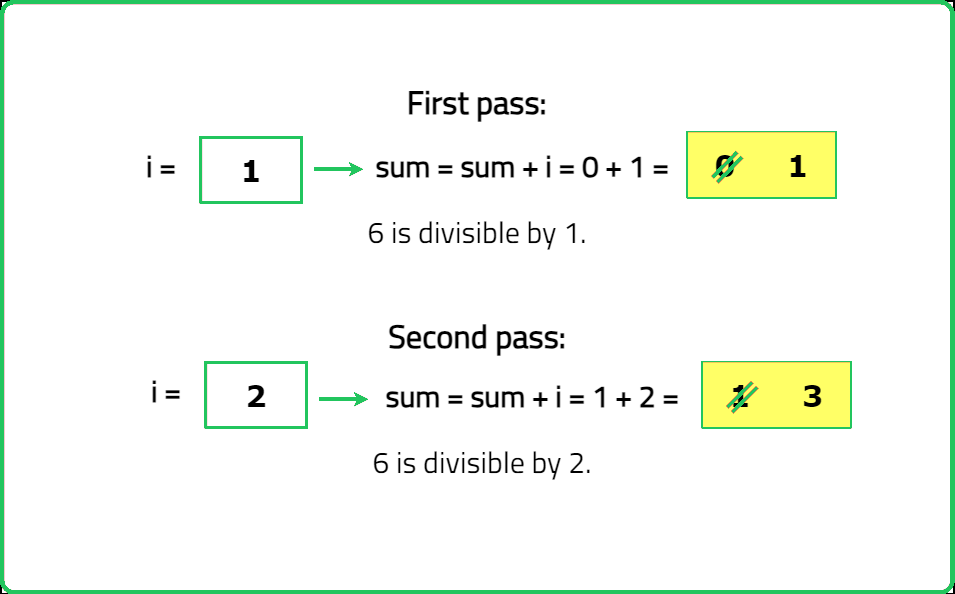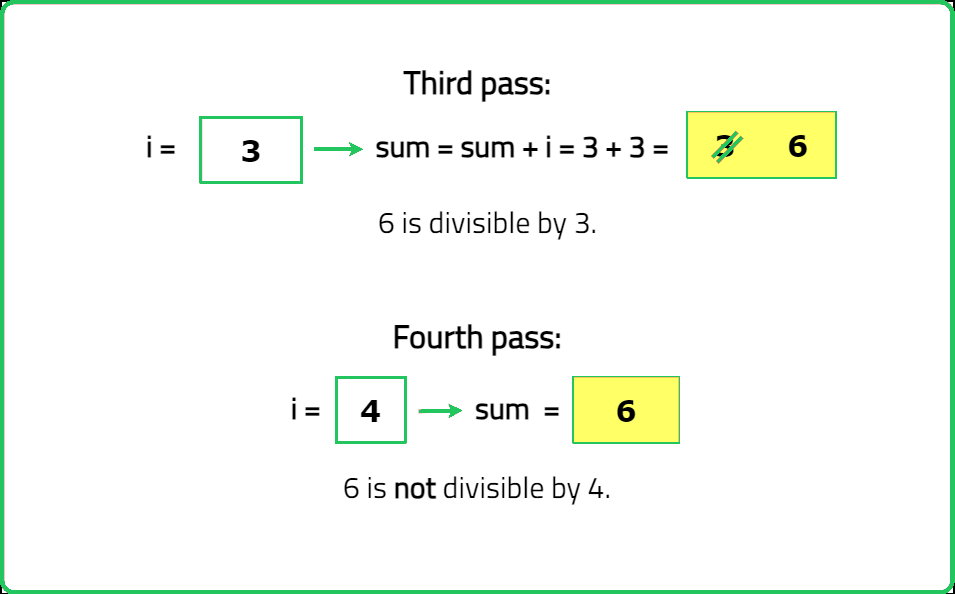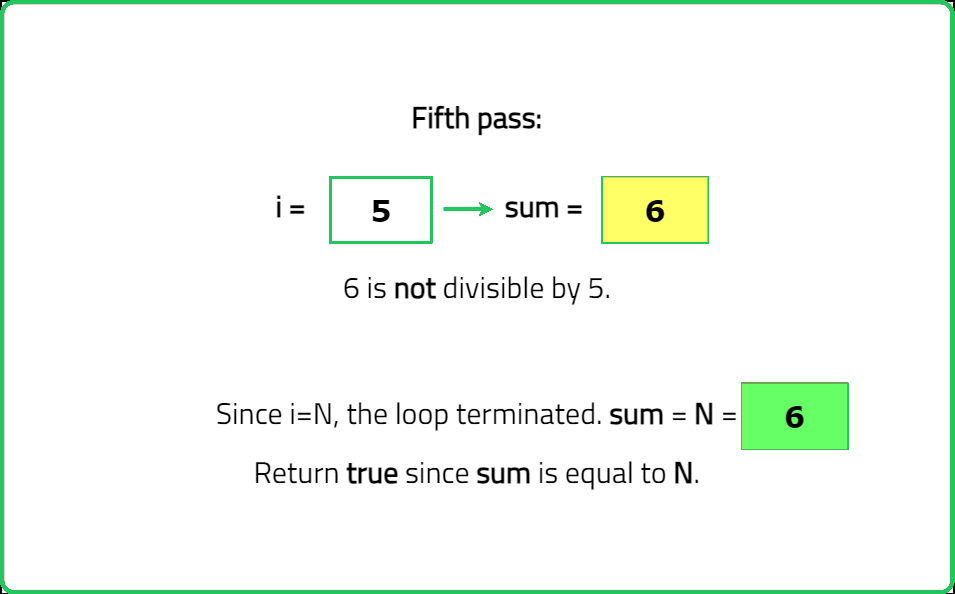Check for perfect number
You are given an integer n. You need to check if the number is a perfect number or not. Return true if it is a perfect number, otherwise, return false.
A perfect number is a number whose proper divisors add up to the number itself.
Examples:
Input: n = 6
Output: true
Explanation: Proper divisors of 6 are 1, 2, 3.
1 + 2 + 3 = 6.
Input: n = 4
Output: false
Explanation: Proper divisors of 4 are 1, 2.
1 + 2 = 3.
Input: n = 28
Constraints
- 1 <= n <= 5000
Company Tags
Editorial
Intuition:
Given a number, all its proper divisors (divisors that divide the number without leaving any remainder, excluding the number itself) can be found and summed up. Then, the sum can be compared with the number itself. If the sum is the same as the number, then it is a perfect number, otherwise, it is not.
Approach:
- Initialize a variable with 0 to store the sum of the proper divisors.
- Start iterating from 1 to the given number(excluding) using a loop variable, and check whether the number is divisible completely (leaving the remainder zero) by the loop variable.
- If it is divisible completely, the current value of the loop variable is a proper divisor which is added to the sum storing sum of proper divisors.
- After the sum is calculated, compare it with the given number. If found equal, the given number is perfect, otherwise, it is not.
Dry Run:








Solution:
#include <bits/stdc++.h>
using namespace std;
class Solution {
public:
/* Function to find whether the
number is perfect or not */
bool isPerfect(int n) {
/* Variable to store the sum
of all proper divisors */
int sum = 0;
// Loop from 1 to n
for(int i=1; i < n; ++i) {
// Check if i is a proper divisor
if(n % i == 0){
// Update sum
sum = sum + i;
}
}
// Compare sum and n
if(sum == n) return true;
return false;
}
};
int main() {
int n = 6;
/* Creating an instance of
Solution class */
Solution sol;
/* Function call to find whether the
given number is perfect or not */
bool ans = sol.isPerfect(n);
if(ans) {
cout << n << " is a perfect number." << endl;
} else {
cout << n << " is not a perfect number." << endl;
}
return 0;
}class Solution {
/* Function to find whether the
number is perfect or not */
public boolean isPerfect(int n) {
/* Variable to store the sum
of all proper divisors */
int sum = 0;
// Loop from 1 to n
for(int i = 1; i < n; ++i) {
// Check if i is a proper divisor
if(n % i == 0){
// Update sum
sum = sum + i;
}
}
// Compare sum and n
if(sum == n) return true;
return false;
}
public static void main(String[] args) {
int n = 6;
/* Creating an instance of
Solution class */
Solution sol = new Solution();
/* Function call to find whether the
given number is perfect or not */
boolean ans = sol.isPerfect(n);
if(ans) {
System.out.println(n + " is a perfect number.");
} else {
System.out.println(n + " is not a perfect number.");
}
}
}
class Solution:
# Function to find whether the
# number is perfect or not
def isPerfect(self, n):
# Variable to store the sum
# of all proper divisors
sum = 0
# Loop from 1 to n
for i in range(1, n):
# Check if i is a proper divisor
if n % i == 0:
# Update sum
sum = sum + i
# Compare sum and n
return sum == n
# Input number
n = 6
# Creating an instance of Solution class
sol = Solution()
# Function call to find whether the given number is perfect or not
ans = sol.isPerfect(n)
if ans:
print(f"{n} is a perfect number.")
else:
print(f"{n} is not a perfect number.")
class Solution {
/* Function to find whether the
number is perfect or not */
isPerfect(n) {
/* Variable to store the sum
of all proper divisors */
let sum = 0;
// Loop from 1 to n
for (let i = 1; i < n; ++i) {
// Check if i is a proper divisor
if (n % i === 0) {
// Update sum
sum = sum + i;
}
}
// Compare sum and n
return sum === n;
}
}
// Input number
let n = 6;
// Creating an instance of Solution class
let sol = new Solution();
// Function call to find whether the given number is perfect or not
let ans = sol.isPerfect(n);
if (ans) {
console.log(`${n} is a perfect number.`);
} else {
console.log(`${n} is not a perfect number.`);
}
Complexity Analysis:
Time Complexity: O(N) – Running a loop from 1 to N.
Space Complexity: O(1) – Using a couple of variables i.e., constant space, regardless of the size of input.
Intuition:
The previous approach can be optimized by using the property that for any non-negative integer n, if d is a divisor of n then n/d is also a divisor (counterpart divisor) of n. This property is symmetric about the square root of n. By traversing just the first half, the redundant iterations and computations can be avoided improving the efficiency of the algorithm.
Approach:
- Initialize a variable with 0 to store the sum of the proper divisors.
- Start iterating from 1 to square root of the given number using a loop variable, and check whether the number is divisible completely (leaving the remainder zero) by the loop variable.
- If it is divisible completely, the current value of the loop variable is a proper divisor which is added to the sum storing sum of proper divisors. Also, using the property discussed above, another proper divisor can be found.
- Note: Before adding the counterpart divisor, it should be checked if both the proper divisors are different and the counterpart divisor is not the number itself. If they are different and the counterpart divisor is not the number itself, the counterpart divisor should be added to the sum. Otherwise, the counterpart divisor should not be added to the sum ensuring that the divisor is not added twice.
- After the sum is calculated, compare it with the given number. If found equal, the given number is perfect, otherwise, it is not.
Edge Case:
When the given number is 1, there are no proper divisors of 1, i.e., the sum of proper divisors of the number is 0. Hence, 1 is not a perfect number.
Dry Run:
#include <bits/stdc++.h>
using namespace std;
class Solution {
public:
/* Function to find whether the
number is perfect or not */
bool isPerfect(int n) {
// Edge case
if(n == 1) return false;
/* Variable to store the sum
of all proper divisors */
int sum = 0;
// Loop from 1 to square root of n
for(int i=1; i <= sqrt(n); ++i) {
// Check if i is a proper divisor
if(n % i == 0){
// Update sum
sum = sum + i;
/* Add the counterpart divisor
if it's different from i and
if it is not n itself */
if(n/i != n && i != n/i) {
sum = sum + (n/i);
}
}
}
// Compare sum and n
if(sum == n) return true;
return false;
}
};
int main() {
int n = 6;
/* Creating an instance of
Solution class */
Solution sol;
/* Function call to find whether the
given number is perfect or not */
bool ans = sol.isPerfect(n);
if(ans) {
cout << n << " is a perfect number." << endl;
} else {
cout << n << " is not a perfect number." << endl;
}
return 0;
}
class Solution {
/* Function to find whether the
number is perfect or not */
public boolean isPerfect(int n) {
// Edge case
if(n == 1) return false;
/* Variable to store the sum
of all proper divisors */
int sum = 0;
// Loop from 1 to square root of n
for (int i = 1; i <= Math.sqrt(n); ++i) {
// Check if i is a proper divisor
if (n % i == 0) {
// Update sum
sum = sum + i;
/* Add the counterpart divisor
if it's different from i and
if it is not n itself */
if (n / i != n && i != n / i) {
sum = sum + (n / i);
}
}
}
// Compare sum and n
if (sum == n) return true;
return false;
}
}import math
class Solution:
# Function to find whether the
# number is perfect or not
def isPerfect(self, n):
# Edge case
if n == 1:
return False
# Variable to store the sum of all proper divisors
sum = 0
# Loop from 1 to square root of n
for i in range(1, int(math.sqrt(n)) + 1):
# Check if i is a proper divisor
if n % i == 0:
# Update sum
sum = sum + i
# Add the counterpart divisor if it's
# different from i and if it is not n itself
if n // i != n and i != n // i:
sum = sum + (n // i)
# Compare sum and n
if sum == n:
return True
return False
if __name__ == "__main__":
n = 6
# Creating an instance of Solution class
sol = Solution()
# Function call to find whether the given number is perfect or not
ans = sol.isPerfect(n)
if ans:
print(f"{n} is a perfect number.")
else:
print(f"{n} is not a perfect number.")
class Solution {
/* Function to find whether the
number is perfect or not */
isPerfect(n) {
// Edge case
if(n === 1)
return false;
/* Variable to store the sum
of all proper divisors */
let sum = 0;
// Loop from 1 to square root of n
for (let i = 1; i <= Math.sqrt(n); ++i) {
// Check if i is a proper divisor
if (n % i === 0) {
// Update sum
sum = sum + i;
/* Add the counterpart divisor
if it's different from i and
if it is not n itself */
if (n / i !== n && i !== n / i) {
sum = sum + (n / i);
}
}
}
// Compare sum and n
if (sum === n) return true;
return false;
}
}
const n = 6;
/* Creating an instance of
Solution class */
const sol = new Solution();
/* Function call to find whether the
given number is perfect or not */
const ans = sol.isPerfect(n);
if (ans) {
console.log(`${n} is a perfect number.`);
} else {
console.log(`${n} is not a perfect number.`);
}
Complexity Analysis:
Time Complexity: O(sqrt(N)) – Running a loop from 1 to square root of N.
Space Complexity: O(1) – Using a couple of variables i.e., constant space, regardless of the size of input.
Notes
Code
true
false
true
Facts
- • This simple mathematical concept is often used in error detection and correction algorithms in software development
- • In particular, it is used during checksum techniques where data is divided into equal parts
- • The sum of these parts should add up to a predefined value (a perfect number in some cases)
- • If the sum isn't a perfect number, it indicates that an error has occurred during data transmission, allowing developers to detect and correct errors
- • These are especially useful in network communications and data storage systems which require high reliability